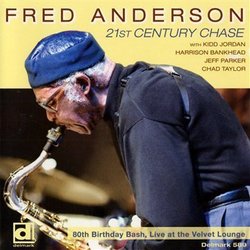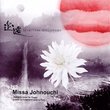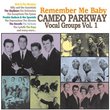A lifetime of exploration and learning
greg taylor | Portland, Oregon United States | 09/22/2009
(5 out of 5 stars)
"Fred Anderson celebrated his 80th birthday on March 29th of this year as only he could. He stood on the stage of his own club, the Velvet Lounge, and played music with a group of his peers. He was joined by Kidd Jordan (age 74!) on tenor, Jeff Parker on guitar, Harrison Bankhead on bass and Chad Taylor on the drums.
The liner notes by Neil Tesser stake a claim to ground this music in the great jazz tradition of a chase- the sometimes contentious, sometimes joyfully friendly sparring of two musicians who exchange phrase after phrase and which frequently climax in simultaneous soli. The tenor saxophone has a long tradition of such heated battles. Tesser references the famous recording made by Dexter Gordon and Wardell Gray back in 1947 called "The Chase" and how that recording influenced the young Anderson and Jordan then 18 and 12 years old.
And he is right. There are times when the combination of Jordan and Anderson is incredibly incendiary and more than worthy of that tradition. Listen to the dual solo around the 7 to 10 minute mark of the first piece. This duo is arguably the best saxophonic friendship in all of jazz right now (although I am very fond of Vandermark-Rempis and several others-remember I said "arguably"- I will not be hoisted on my own aesthetic petard). They play with great tone, they seem endlessly inventive and very in tune with the others. And Parker, Taylor, and Bankhead are outstanding. They are leaders of the music in their own right, frequently launching everyone in a new direction within Anderson's compositions.
Because of the length and power of the first piece, I recommend that you split your listening in two. Listen to the first composition and then take a break and absorb some of what you just heard. Maybe listen to it again.
Part II of 21rst Century Chase starts off very different. Bankhead's arco leads us into the tune. His playing is sly, full of odd changes in rhythm, skittering harmonics and slides. I have been listening to string players since I was a wee lad and this guy is good. Not very classical in his approach, perhaps, unless your idea of classical is post-Bartok. The other players start to interject their comments and suggestions after a few minutes. If you are new to this kind of jazz, this is a great place to learn to listen to it. It is a conversation, very Shakespearean in its approach. There are asides, soliloquys, jokes being shared, squabbles and sometimes a struggle for control of the conversation. And sometimes, like on this piece, everyone insists on having their say. They create a wall of sound by the 9 minute mark that is powerful and exhausting. I have no idea how people play like this and not drop to the ground for a nice nap at the end of the performance.
Finally the Ode to Alvin Fielder. Parker leads the way. He has become one of my favorite contemporary guitarists. I love the lack of fussiness about his tone, I love the way his phrases frequently change direction and his sense of rhythm. It is a style that is very traditional and very much his own. Parker is a fine example of one aspect of the jazz musician-the good ones never stop growing as musicians.
Tesser's notes opine that this is the most traditional in structure of Anderson's compositions. He is right. There is one guy after another weaving musical magic while being supported by a learned group of peers. Not a bad tradition that. If you come to this CD from a bop or hard bop this might be the best place to start. I said it before and will say it again. Both Anderson and Jordan have great tone. The last few minutes feature the two tenors together again. A great way to end what must have been a very powerful set of music to hear live.
In conclusion, I want to expand a little on my title. The music scene of the last fifty years has helped to generate an unexpected phenomena with many of the musicians who came out of the 60s. A lot of those guys, as they aged and their popularity waxed and waned, did something remarkable. They found homes as educators, both in their communities and in institutional settings. I am talking about musicians as different as Ken McIntyre, Yusef Lateff, Joe McPhee, Muhal Richard Abrams, Anthony Braxton. By keeping his club going all these years, in spite of many difficulties, Fred Anderson provided the same function. He provided a setting for younger musicians to cut their teeth, to get paid, to play with and hear their elders. A place where the tradition of bop and post-bop creative music styles that go under the label jazz could be practiced and changed. And that whole time, for over fifty years now, Fred Anderson has played those musics to the point where he embodies that whole tradition. To the point where he can stand on a stage at age 80 and lay that history of learning and truth down. Anderson is simply a marvel.
At the very least, we can listen to what the man and his compadres have to say. Listen to this performance and tell me what you think."



